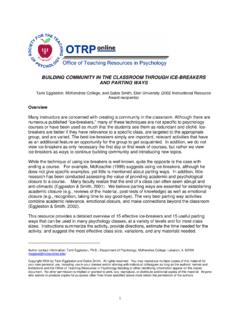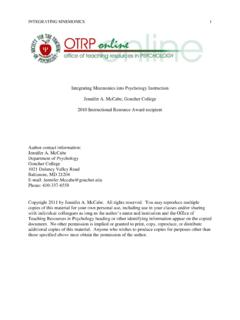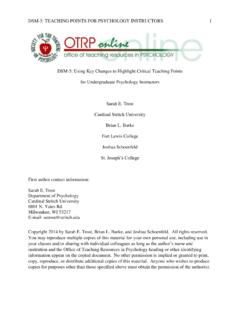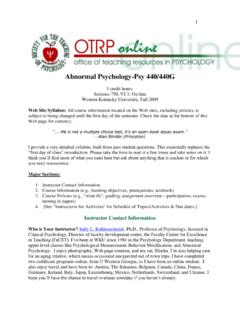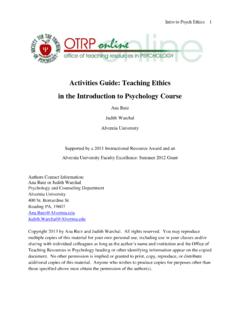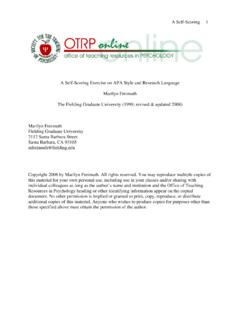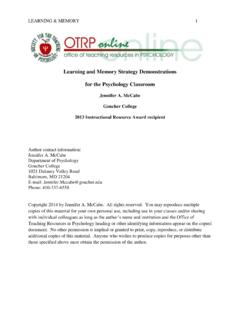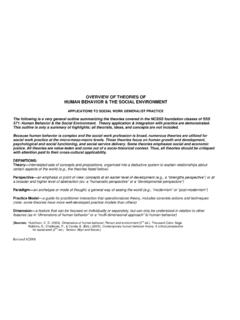Transcription of Introduction to Social Psychology
1 PSYCH 221 Course Objectives, Policies & Syllabus Page 1 of 6 Course Objectives, Policies and Syllabus PSYCH 221 Introduction to Social Psychology Dr. Rick Harnish, Fall 2007 Location Days and Times Class: 44G Bissell Tuesday and Thursday 12:30 1:45 Office Hours: 131 Engineering Tuesday and Thursday 2:00 3:30 Individual assistance is always available by appointment 724-334-6735 Prerequisites To be qualified to take this course, you must have successfully completed: PSYCH 100 (Psy 2) Introduction to Psychology Overview What is Social Psychology ? Social Psychology is the scientific study of how people think about, evaluate and respond to their Social experiences. Social psychologists are interested in understanding a wide range of phenomena.
2 Some topics of interest that we will explore in this course include: person perception, the self, attitudes, emotions, socialization, groups, influence, interpersonal attraction, close relationships, altruism, cooperation, competition, aggression, prejudice and discrimination. Why should I study Social Psychology ? In much of your waking life, you are interacting with others. Think about how you began each day. It is likely that you came down to breakfast, made small chat with a family member(s) or a roommate, ate, dressed, packed, and left the house. In your car, you picked up your best friend and began chatting about the last gossip from Hollywood. You arrive on campus and meet other friends and exchange notes on a class.
3 Now examine these interactions as a Social psychologist would. At the heart of our interactions is our attempt to influence other persons. (At breakfast, if I compliment dad on his tie, will he be more likely to let me use his sports car this weekend to impress that new girl down the street? If I agree with best friend Jennifer s assessment of the latest Jessica Alba movie, will she be more likely to loan me that sweater that look better on me than her? If I offer my English 15 notes to a friend I see on campus, will he take notes for me in Biology 121 next Wednesday?) Our attempts to influence others begin with how we perceive others, what attitudes we hold toward others, and finally, our behavior directed toward others.
4 Understanding how you come to conceptualize your Social world should be very beneficial in explaining why you (and others) act the way you (and they) do. There are two components to this course: one is experientially-based and the other is theory-based. These two dimensions will be synthesized in the seminar discussions, readings, and assignments. This will require the ability to learn from experience as well as in-class activities. Course Goal The goal of this course is to provide you with a general Introduction to Social Psychology and an opportunity to apply Social psychological theories to your life. PSYCH 221 Course Objectives, Policies & Syllabus Page 2 of 6 Course Objectives By the end of the course, you should be able to: 1.
5 Summarize general information, through in-class discussion and assignments, pertaining to Social psychological theories; 2. Demonstrate knowledge, through examination procedures, of the major theories and research findings in Social Psychology . 3. Become familiar with Social psychological literature through independent reading and writing assignments. 4. Apply Social psychological theories and principles to your everyday behavior. Text The required text for the course is: Taylor, , Peplau, & Sears, (2006). Social Psychology , 12th Edition. Upper Saddle River, NJ: Prentice Hall. The text is available at the Penn State Bookstore and various online shops. NOTE: If you are obtaining the text through procurers other than the Penn State Bookstore be sure to order the 12th edition.
6 There are considerable differences between the 12th and 11th editions. A copy of the text will be on reserve at the Penn State New Kensington Library. Assignments The material of this course will be presented through assigned readings, discussion (this course will use a seminar format), and outside class assignments. Because of the unique format of this course, I expect you to actively participate. This means that the in-class assignments will revolve around student-led discussions where my role will be to facilitate the discussion. Reading: For each unit, there is required reading. One student will be assigned reading for the unit and expected to lead a discussion of the material. (Dates and presenter will be distributed next class.)
7 Thus, you will need to complete the assigned reading for the class before the discussion. Reading the assigned text and participating in discussion is the main way to understand the material of this course. The readings associated with each week of discussions are attached. Participation: As noted earlier, your active participation is expected in this course. Because your participation is expected, your attendance is required. MISSING THREE OR MORE CLASSES WILL AUTOMATICALLY LOWER YOUR COURSE GRADE BY ONE LETTER GRADE OR MISSING THE CLASS IN WHICH YOU ARE LEADING THE DISCUSSION ALSO WILL AUTOMATICALLY LOWER YOUR COURSE GRADE BY ONE LETTER GRADE. Thus, you should avoid making any vacation plans before December 13, 2007 and plan doctor s appointments, errands and the like after class time.
8 Punctual ( on-time) classroom attendance is required. Arriving late to class is distracting and diminishes the educational attainment of those attending class in accordance with University policy. Personally, I think it is rude and inconsiderate to obstruct the serious pursuit of learning that students are entitled to and expect. Thus, students enrolled in this course are required to attend class on time. PLEASE DO NOT BE LATE FOR CLASS. ARRIVING LATE TO CLASS EXCESSIVELY (MORE THAN TWO CLASSES) WILL RESULT IN THE LOWERING OF YOUR COURSE GRADE BY ONE LETTER GRADE. Evaluation Leading Discussion: Each student will be assigned a unit in which they will lead the class discussion. You will read the material, create a series of discussion questions, and lead the class in a discussion of the unit material (based on the questions you generate).
9 Your leading the unit discussion(s) will account for approximately 25% of your grade. You will be responsible for generating a list of discussion questions PSYCH 221 Course Objectives, Policies & Syllabus Page 3 of 6 to be distributed the week PRIOR to your scheduled discussion as well as leading the class on your assigned day. You will send me your discussion questions prior to their distribution for my review. IF YOU MISS THE CLASS IN WHICH YOU WERE ASSIGNED TO LEAD THE CLASS DISCUSSION, YOUR COURSE GRADE AUTOMATICALLY WILL BE LOWERED BY ONE LETTER GRADE. Participating in Discussion: If you are not leading a discussion, you will be actively participating in the class discussion. In order to MEANINGFUL CONTRIBUTE to the class discussion, you will read the material prior to class AND prepare answers to the discussion questions.
10 You will turn in your answers to me after the class discussion. Attached are details on the unit topics. Your participation in the class discussions will account for approximately 25% of your grade. Weekly Personal Projects: Because the focus of this course is understanding how people think about, evaluate and respond to their Social experiences, you will be required to write a thought paper exploring Social psychological explanations for a phenomenon. These thought papers can be best thought of as short essays in which you review a theory or research on a topic and explain how the theory or research findings can explain an issue you encountered in your life. The thought papers will account for approximately 50% of your grade.
